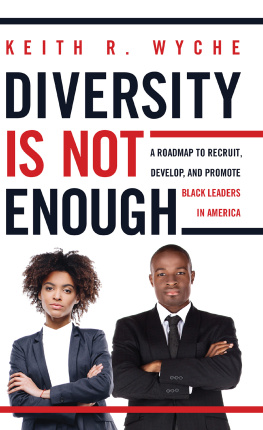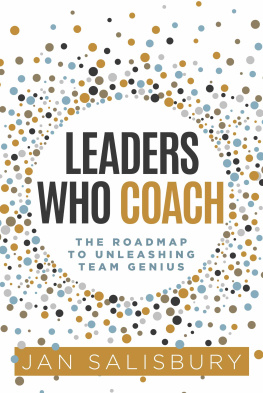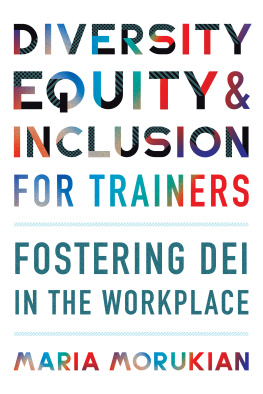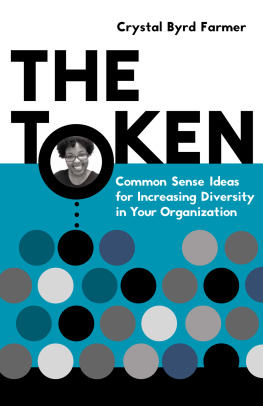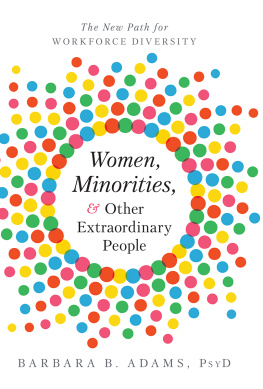Copyrighted Material
Diversity Is Not Enough: A Roadmap to Recruit, Develop, and Promote Black Leaders in America
Copyright 2021 by Kandelle Publishing. All Rights Reserved.
No part of this publication may be reproduced, stored in a retrieval system or transmitted, in any form or by any meanselectronic, mechanical, photocopying, recording or otherwisewithout prior written permission from the publisher, except for the inclusion of brief quotations in a review.
For information about this title or to order other books and/or electronic media, contact the publisher:
Kandelle Publishing
3152 Little Road Suite 180
Trinity, FL 34655
www.keithwyche.com
ISBNs:
978-1-7369390-2-4 (hardcover)
978-1-7369390-0-0 (softcover)
978-1-7369390-1-7 (eBook)
Library of Congress Control Number: 2021912329
Cover and Interior design: 1106 Design
Editorial work by: Ellena Balkcom
Written on Purpose Communications
I dedicate this book to honor the memory of my grandparents Daniel and Della Wyche and Ezekiel and Estella Davis for making a way, and to my grandchildren, that you will continue to lead the way!
ACKNOWLEDGMENTS

A s I reflect upon my forty-year professional career , I must admit it has been and continues to be one heck of a journey. From the classroom to the boardroom, I have had to grow, stretch, evolve and endure. When I reminisce on the years I invested preparing for this adventure, from high school to graduate school and all the continuous learning beyond, I can honestly say Ive been blessed to receive quite a return on those investments. From operating a Kool-Aid stand on the streets of Cleveland, to operating billion-dollar businesses all over North America, I am most assuredly my ancestors wildest dream. However, my experience is not unique. Many of the Black professionals I have encountered along this journey are also living testimonies to the support, encouragement, sacrifices and motivation weve received from the shoulders on which we all stand.
I give all the credit and glory to God for his blessings and favor over my life and for being with me every step of the way, even during those seasons when I felt alone. I thank God for the doors that He opened, as well as the doors He let remain closed in order to fulfill His purpose for my life. I want to acknowledge my parents, LeRoy and Velvet Wyche, who laid the foundation, provided opportunities to learn and set clear expectations that good is not acceptable, if excellence is achievable. Such generational wisdom was imparted to my sisters, Valerie and Karen, as well, and has been passed down to my children and now my grandchildren.
Helping me on this journey for more than fifty years has been my guardian angel, Carla Maria. She has been in my corner as a classmate, friend, wife, business partner and the motivation behind my becoming an author and speaker. I can never thank you enough.
I must also acknowledge my mentors, coaches, sponsors and proteges for their support, advice, counsel, and kind correction as we shared and learned together over the years. A special recognition to my editor, Ellena Balkcom, who helped me push the envelope to deliver real and relevant content.
Last, I want to acknowledge all of the young, gifted and Black professionals still striving to achieve your goals and dreams. Rather than pass the torch, I hope this book helps to light your torch, so you can continue to be that light that shines the way for the next generation of Black leaders. And always remember:
Our wings were made for the sky.
No matter what, we must fly.
Lyrics by Onaje Allan Gumbs and Charles Allen from the song Dare to Dream
Be Ever Wonderful,
KEITH R. WYCHE

INTRODUCTION

I n May of 2020, three words shook the very core of our nation and simultaneously summarized the sentiments of an entire race. I. CANT. BREATHE. Not being able to breathe in this country has taken on many forms over the centuries since the Emancipation Proclamation. The restriction of breath has come through too little effort, broken promises, inequality, and, at times, undeniably inhumane treatment. Since Reconstruction, America has attempted with limited success and varying degrees of sincerity to make amends for its original sin of slavery.
However, almost as quickly as it rolled out these limited efforts, America found ways to renege on her promises. The promise of Reconstruction that was made by President Lincolns administration was swiftly denounced and eliminated by the administration of President Andrew Johnson. For Black Americans, the limited promises of Franklin D. Roosevelts New Deal were met with racist Jim Crow laws that swiftly made the New Deal a raw deal. The glimmer of hope provided by Civil Rights Era policies like Affirmative Action and Equal Opportunity were minimized, ostracized, and mostly nullified by Jim Crows more sophisticated, educated, and well-dressed offspring, James Crow, Esq.
And as recent history illustrates, the nations latest incarnations as attempts to right the wrongs of the past, like Diversity, Equity and Inclusion (DE&I) programs and efforts have been diluted to minimize the progress and upward mobility of the very group it was intended to upliftnamely, Black Americans. To quote Dr. Martin Luther King Jr., America has given the Negro people a bad check, a check which has come back marked insufficient funds. As anyone who has ever been handed a bad check knows, the impact is never just the fraud of whats promised on the endorsement of the checkbut rather its the financial, mental, and emotional scars it leaves behind that creates a lasting lack of trust.
Many DE&I efforts are watered down attempts to appear compliant with politically and socially correct action and are merely a way to save face and document half-hearted gestures. Put simply, many DE&I initiatives are put in place to check a box. A prime example is the Rooney Rule created by the National Football League to increase the number of Black coaches. This has become a check the box exercise that allows NFL owners to waste the time of promising Black head coaching prospects, so they can quickly hire the often less qualified White coach they wanted in the first place. Worse yet, Kansas City Chiefs Offensive Coordinator Eric Bieniemy Jr. was never given an opportunity, despite having amazing credentials. Bieniemys offense has taken the Chiefs to back-to-back Super Bowls, yet once again he was passed over for the six head coaching opportunities he interviewed for in 2021. Meanwhile, other White candidates with no NFL coaching or playing experience have been named head coach instead (such as Matt Rhule, by the Carolina Panthers). This is at the very least insulting and reminiscent of the old separate but equal days of our past.
Corporate America is equally as guilty of failing to recognize, develop, and provide equal opportunities for Black business professionals, often to the benefit of other under-represented groups. In 2020, while we celebrated having thirty-eight female CEOs running Fortune 500 companies (one Black), we have only four Black CEOs in the same category. As the number of women serving on corporate boards has increased to 19.2 percent, the number of Blacks serving on corporate boards has remained relatively stagnant. And rather than increase this number by selecting from the large number of board-ready Black executives, the practice historically for many Fortune 500 companies is to identify a small number of high-profile Black executives and place them on as many boards as possible.

